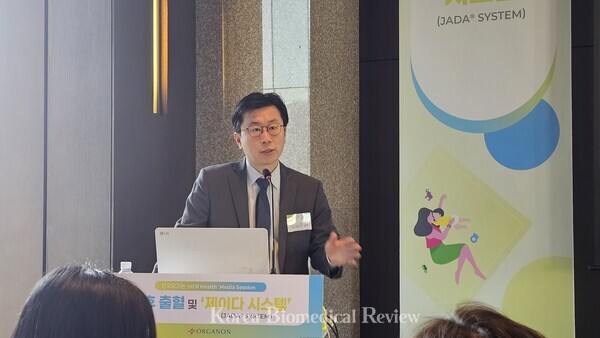In an era of declining birth rates, ensuring a safe and healthy baby delivery environment for mothers has become an increasingly pressing concern.

However, postpartum hemorrhage (PPH)—one of the most common and severe childbirth complications—remains a critical issue with limited treatment options. Addressing this unmet medical need, Organon Korea hosted a media session on Wednesday and introduced the JADA System, an innovative medical device designed to rapidly and effectively control PPH, marking a significant milestone in maternal healthcare.
PPH is defined as blood loss exceeding 1,000 mL or significant blood loss within 24 hours of delivery, accompanied by hypovolemic symptoms. Normally, the uterus contracts post-delivery, helping to stop bleeding.
However, in cases of uterine atony, where contractions fail, excessive bleeding persists, posing a severe risk to maternal health.
According to the World Health Organization (WHO), PPH affects one in six mothers worldwide and remains the leading cause of maternal mortality, particularly in low- and middle-income countries. In Korea, complications from labor and delivery, including PPH and uterine atony, accounted for 34.8 percent of maternal deaths in 2021, making it the most common cause of maternal mortality.
The JADA System, which received approval from Korea’s Ministry of Food and Drug Safety (MFDS) in March 2023, is designed to swiftly control postpartum bleeding by creating a negative pressure environment inside the uterus. The device is connected to a vacuum source, applying subatmospheric pressure to induce physiological contraction and stop bleeding within minutes.
The efficacy and safety of the JADA System have been demonstrated in two major clinical studies. The PEARLE study, a multicenter, prospective, single-arm trial, evaluated the device in 107 women with uterine atony who had delivered at 34 weeks of gestation or later.
The results showed that 94 percent of participants experienced effective bleeding control, with a median time of just three minutes to achieve hemostasis.
Additionally, the RUBY study analyzed real-world data from 800 patients treated with JADA across 16 hospitals in the U.S. between October 2020 and March 2022. The study found that the device successfully controlled bleeding in 92.5 percent of vaginal delivery cases and 83.7 percent of cesarean section cases.
Surgical interventions such as uterine artery embolization and suturing techniques are available but come with significant limitations.
During the event, Professor Cho Geum-joon of the Department of Obstetrics and Gynecology at Korea University Guro Hospital explained the importance of treating PPH and the significance JADA Systems launch in Korea.
"Uterine artery embolization requires the patient to be in a stable condition and is generally performed only in tertiary hospitals, while surgical suturing often necessitates open abdominal surgery, making it unsuitable for vaginal delivery patients,” Cho said. "In real-world practice, we often face situations where standard treatment options do not work quickly enough, especially in severe cases of uterine atony.”
JADA offers an alternative that is both rapid and minimally invasive, which is a significant advancement for obstetricians managing critical bleeding cases, he added.
Cho stressed that another key challenge with traditional methods is that they rely heavily on the clinical experience of the medical staff, which can result in inconsistent outcomes.
“The JADA System simplifies the process by providing a structured, reproducible treatment protocol that ensures a higher success rate across different clinical settings," Cho said. "Having a treatment option like JADA, which can be implemented quickly with minimal training, is crucial for hospitals of all sizes.”
In smaller hospitals where advanced interventions like embolization may not be feasible, JADA can be a life-saving alternative, he added.
Organon’s commitment to enhancing women’s health is evident through its efforts to provide innovative solutions tailored to female-specific medical conditions.
Concluding the event, Organon Korea Managing Director Kim So-eun highlighted the broader societal impact of postpartum complications.
"PPH is not just a maternal health issue—it affects newborns, families, and society as a whole,” she said. “By introducing JADA to Korea, we aim to create a safer childbirth environment and contribute to the country’s efforts to address its declining birth rate.”
Related articles
- Organon Korea sales and customers lead named new head for Organon Malaysia
- Women’s hesitation to seek menopause treatment risks long-term health
- Maternity care policy falls short of securing ob-gyns in risk areas: study
- Postpartum care centers to face government evaluations starting 2026
- Organon adds mood tracking to Propecia app in Korea, with global rollout ahead

